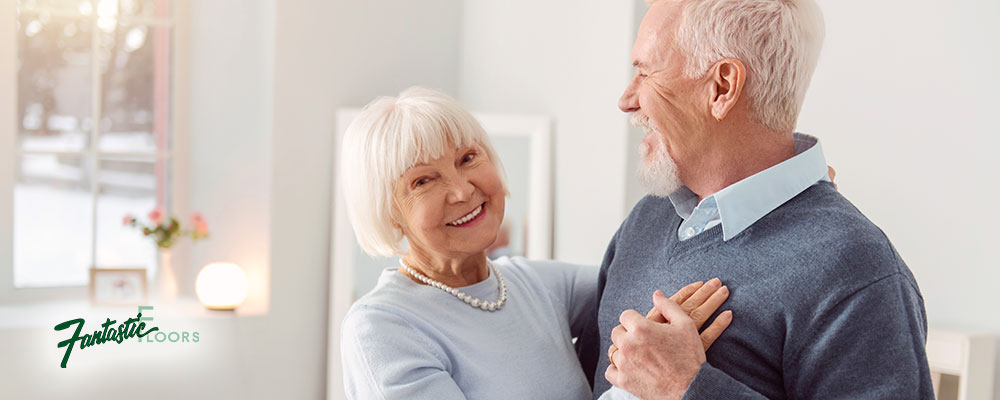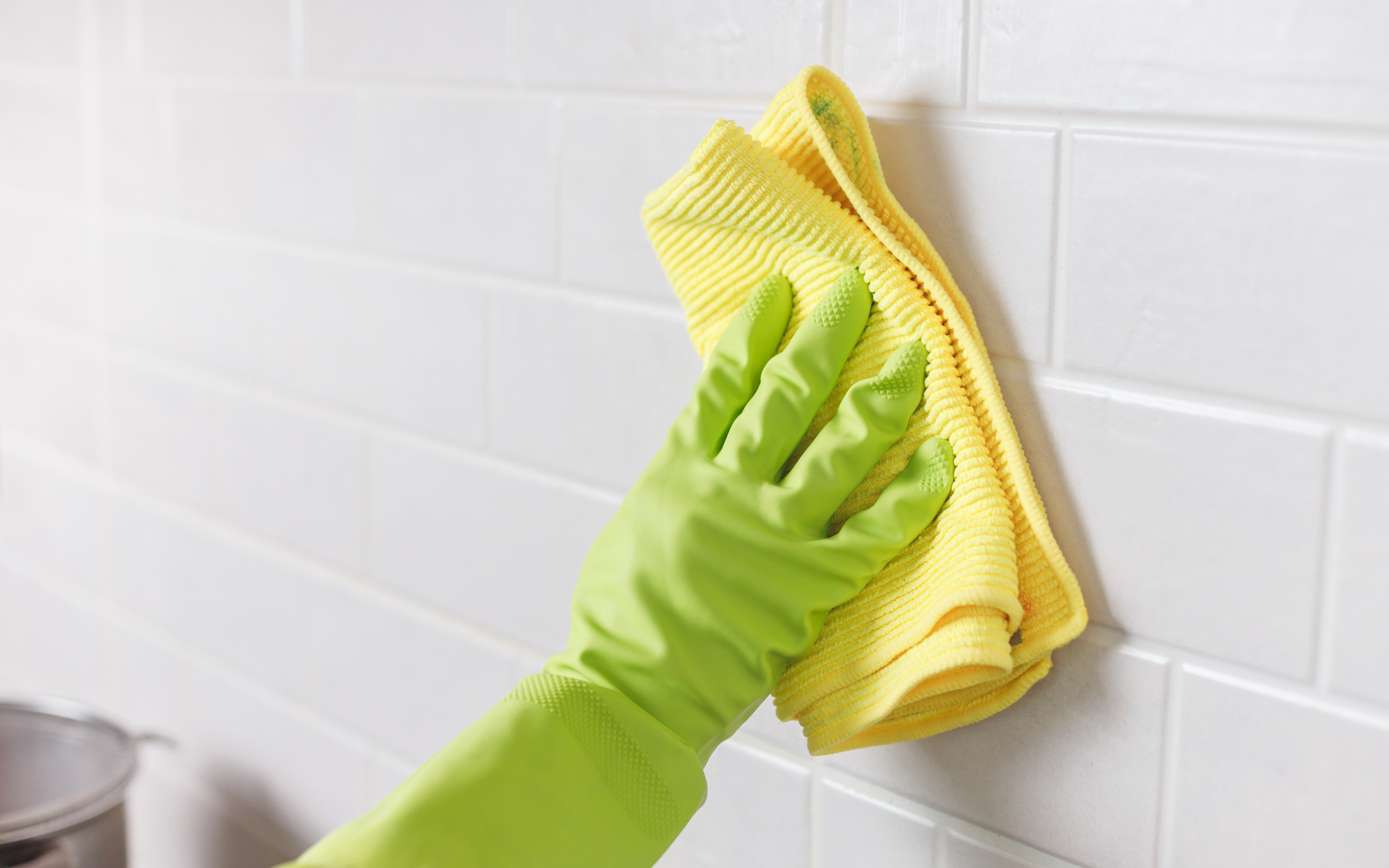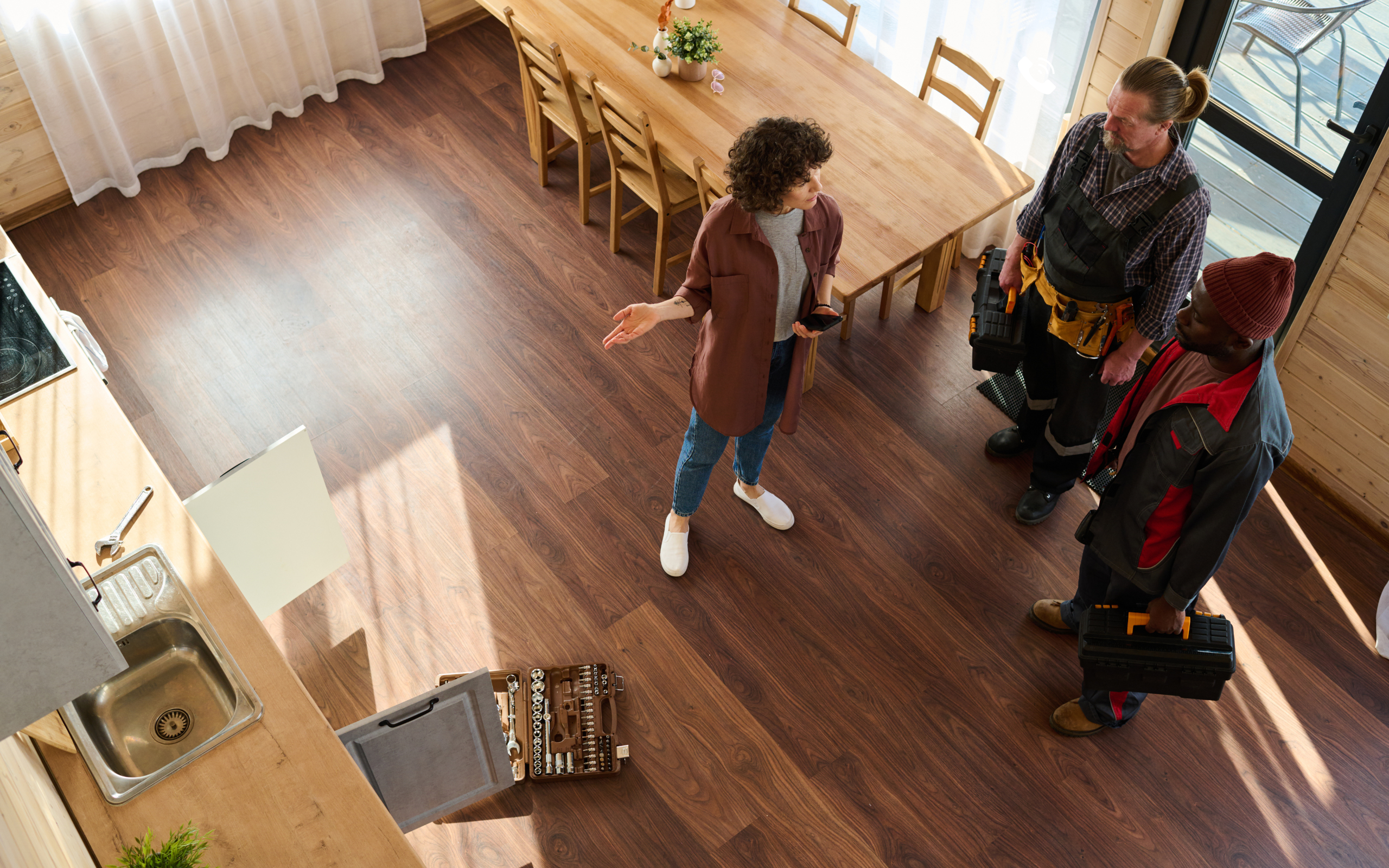Best Carpet Installers in Houston
Choosing a flooring material for older homeowners who want to age in place in their homes doesn't need to be complicated. The trick is to consider five main factors and to prioritize those factors for each type of flooring and how and where you will use it. The five factors are:
- Slip-resistance: Does the flooring material offer a non-slip surface even when wet?
- Ease of travel: Is the flooring material easy to move over for a person using a cane, walker, or wheelchair?
- Cleaning and maintenance: How much work does it require to maintain the flooring.
- Comfort: How does the flooring material feel underfoot?
- Cushion: Does the flooring offer some shock absorption in the event of a fall?
The importance of these qualities may vary depending on the location. For example, if you're looking for bathroom flooring, it's most important to choose a non-slip material that's easy to walk on and is easy to clean and maintain. In a hallway, ease of travel may be most important, while in a living room, comfort may be the top consideration.
1. Carpeting
Benefits
- Soft: Carpet is a very cushiony material that is comfortable underfoot and provides some protection against injury from falls. A high-quality carpet pad beneath the carpeting can greatly improve both the comfort and safety of the flooring.
- Warm: Carpet is relatively neutral when it comes to temperature: it doesn't retain heat or cold like many hard flooring materials. While it doesn't insulate against cold, it's much more pleasant to the feet on a cold morning than ceramic tile, for example.
- Quiet: Carpet absorbs sound and is virtually silent to walk on.
Drawbacks
- Air quality: The fibers of carpeting tend to collect dirt and dust that floats through the air, and it is difficult to remove all dirt with a vacuum. This can be problematic for people with severe allergies or respiratory sensitivities. Some carpeting may off-gas chemicals such as formaldehyde, especially when they are new. For people with chemical sensitivities, this can be a problem.
Cleaning: Carpeting doesn't do well in wet areas, like bathrooms, or in wet and dirty areas, such as kitchens. It stains very easily and is difficult to deep-clean, which usually requires a professional carpet cleaner.
Travel: Wheelchairs don't roll as well over the carpet as over hard flooring. Long-pile carpet, in particular, can present a trip hazard. Because of this, carpet for senior citizens should have pile no more than 1/2 inch thick, and the underlying padding should be firm and not too thick. Quality high-density foam or felt padding can a good choice.
2. Cork
Benefits
- Softness: Cork is a medium choice in the hard-soft continuum. It has a smooth, washable surface but still offers some cushion underfoot. It's also not as loud as very hard materials and offers some thermal and sound insulation properties.
Smooth travel: Cork is hard enough for efficient wheelchair travel, and it won't catch feet as carpeting can.
Cleaning: As long as a cork floor is properly maintained, it is relatively easy to clean and care for. The sealant over the surface protects the porous material from stains, and all that is necessary is to do is sweep or vacuum regularly to keep it looking its best.
Drawbacks
- Water and damage: Because cork is so soft, it can be damaged relatively easily by punctures from furniture legs, pointy heels, or any sharp object poking or scraping its surface. It's only moderately resistant to water: Spills should be wiped up immediately, as standing water can get into the seams of the flooring tiles or planks and damage the material's core.
3. Linoleum
Linoleum is the original resilient flooring material, made primarily from natural plant materials. Although it was largely replaced by vinyl flooring for many years, linoleum has made a comeback due to its natural qualities and other virtues.
Benefits
- Cleanliness: Linoleum is easy to clean and maintain. It doesn't hold onto dust, pollen, and other air contaminants as does carpeting.
- Durability: Linoleum is water- and stain-resistant enough to work well in kitchens and bathrooms, but standing water can get into the seams of linoleum tiles and planks. Sheet linoleum is more water-resistant.
- Smooth and hard: Linoleum has a flat, smooth surface and is installed directly over subflooring or wood underlayment, so it is good for wheelchairs and walkers.
- Natural: Many homeowners like the fact that linoleum is made with natural materials, such as linseed oil, pine rosin, and cork or jute. This makes it a natural alternative to its closest cousin, vinyl flooring.
Drawbacks
- Cost: Linoleum can be a relatively expensive flooring material, starting at around $3 to $4 per square foot for the material itself, not including installation.
- Hardness: While not as hard or cold as tile, linoleum offers very little cushion and can be relatively cold underfoot.
4. Vinyl
Benefits
- Cleaning and durability: Vinyl offers the same hard-wearing and low-maintenance benefits of linoleum.
Water-resistance: Vinyl is a highly water-resistant material, and high-quality luxury vinyl is virtually waterproof. However, the seams in vinyl tile and planks can let water through to the subfloor, so standing water can be a problem. In bathrooms and kitchens, sheet vinyl is ideal because it has few (or sometimes no) seams.
Cost: Vinyl covers a wide price range but is generally one of the most affordable flooring options, and it lends itself to DIY installation.
Hardness: Vinyl is relatively hard and smooth, making for easy travel, but it's not as hard or as cold as tile.
Drawbacks
- Look and feel: Vinyl is plastic, and it looks and feels like plastic. That's probably why it's primarily used in kitchens, bathrooms, mudrooms, laundry areas, and entryways, but not in living rooms and other areas where comfort and appearance are critical. However, newer forms of luxury vinyl flooring (LVF) are considerably more attractive than standard vinyl, and it can be manufactured to convincingly mimic wood grains or stone.
5. Rubber
Benefits
- Safe: Rubber flooring is traditionally used in gyms and exercise room where it's important to have a surface that's safe for vigorous physical activity. It is both shock- and slip-resistant.
- Durable: Rubber flooring is very resistant to damage from furniture, equipment, or water. However, the seams are vulnerable to letting water through to the subfloor. It can be laid over concrete, adding comfort and safety to outdoor areas and basements.
Drawbacks
- Cost: Rubber flooring can be pricey. Basic snap-together tiles can be relatively affordable, and they're very easy to install yourself, saving the cost of professional installation.
Look and feel: Rubber is anything but cozy. It also comes in very limited styles, colors, and textures.
6. Hardwood, Bamboo, and Laminate
Benefits
- Hard but natural: Wood, bamboo, and laminate flooring is a hard surface with a soft, natural look. It's generally easy to clean and maintain and doesn't get as dirty as carpet.
- Beauty: You can't beat the look of real hardwood or bamboo flooring. Laminate looks pretty good, too, and at a fraction of the cost of real hardwood or bamboo.
- Cost (laminate): Laminate can cost less than $1 per square foot, but you should spend a bit more to get decent-quality material. Bamboo and hardwood are considerably more expensive.
Drawbacks
- Moisture and care: Hardwood flooring can last for many years if it's properly cared for, but it's not water-resistant enough for the bathroom and can be a maintenance issue in the kitchen. It should regularly be vacuumed to remove grit that can damage its finish. Standing water can cause permanent staining and damage.
- Noise: All wood and bamboo floors are pretty loud and offer no sound absorption. Laminate is particularly noisy under hard shoes and when something is dropped onto the floor.
- Hard and unforgiving: These flooring materials are nearly as hard as ceramic tile, and offer no protection against injury from falls.
- Cost and Installation: Solid hardwood and bamboo are relatively expensive and usually require professional installation. Click-together flooring—available with engineered hardwood and bamboo and all laminate flooring—is less expensive and good for DIY installation.
7. Flooring Materials For Seniors To Avoid
Natural stone: A very hard and unyielding material, natural stone also requires regular maintenance to keep the material clean. Polished stone flooring is extremely slippery when wet. Like ceramic or porcelain tile, stone floors can be very cold—unless installed with a radiant heating system below the surface flooring.
Ceramic or porcelain tile: Tile is extremely hard-wearing and highly water-resistant, but it's a very hard material and is cold underfoot. Tiles with wide grout joints or uneven surfaces can be a trip hazard. Standard tile is very slippery when wet. If the tile is used anywhere, it should have a coefficient of friction (COF) of 0.6 or higher for slip-resistance.
Area rugs and transitions: Area rugs can be slippery on hard floors and can easily bunch up to create a serious trip hazard. With any flooring material, you should avoid tall transitions between rooms or transitions between different materials; floors should be as flush as possible, for both ease of travel and to prevent tripping accidents.
Source: thespruce
About Fantastic Floors, Inc. We are a successful company with more than 25 years of experience in the market, we have the infrastructure, high quality equipment, materials and supplies to achieve and exceed the expectations of our customers, allowing us to gain the confidence and loyalty for our services.
We have more than 500 residential, 300 properties and 25 commercial customers totally satisfied with our services.

Best Carpet Installers in Houston.
Fantastic Floors, Best Carpet Installers in Houston, Best Floor Installers in Houston, A/C Duct Cleaning in Houston, Best Carpet Cleaning in Houston, Best Carpet Installation in Houston, Best Carpet Shampoo in Houston, Best Floor Installation in Houston, Carpet Cleaning Companies in Houston, Carpet Cleaning in Houston, Carpet Installation in Houston, Carpet Sale in Houston, Ceramic Tile Sale in Houston, Commercial Carpet in Houston, Commercial Flooring in Houston, Emergency Water Damage in Houston, Floor Installation in Houston, Flooring in Houston, Flooring Companies in Houston, Hardwood Floor Installation in Houston, Professional Carpet Installation in Houston, Professional Floor Installation in Houston





